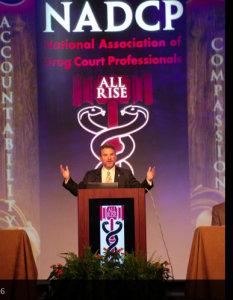June 12, 2012
 Dr. Doug Marlowe, NADCP Director of Science and Law is a clinical psycologist and attorney, widely acknowledged, as the foremost authority on the science behind Drug Courts and evidence-based Drug Court systems (seen in photo on left). At the NADCP conference in Nashville last week, he spoke at a number of workshops, attended by hundreds of attendees and moderated a plenary panel session whose participants were a who’s who of the drug court and drug treatment field ( “Reconstruction After the War on Drugs”). His two part Drug Court Practitioner Fact Sheets, Targeting the Right Participants for Adult Drug Courts and Alternative Tracks in Adult Drug Courts: Matching Your Program to the Needs of your Clients, were the only documents included along with the conference agenda, provided to nearly 4500 attendees.
Dr. Doug Marlowe, NADCP Director of Science and Law is a clinical psycologist and attorney, widely acknowledged, as the foremost authority on the science behind Drug Courts and evidence-based Drug Court systems (seen in photo on left). At the NADCP conference in Nashville last week, he spoke at a number of workshops, attended by hundreds of attendees and moderated a plenary panel session whose participants were a who’s who of the drug court and drug treatment field ( “Reconstruction After the War on Drugs”). His two part Drug Court Practitioner Fact Sheets, Targeting the Right Participants for Adult Drug Courts and Alternative Tracks in Adult Drug Courts: Matching Your Program to the Needs of your Clients, were the only documents included along with the conference agenda, provided to nearly 4500 attendees.
In his presentations and two part Fact Sheets he laid out a clear message for the drug court and the criminal justice field in general. Drug Courts are not for everyone. Only those individuals who are drug dependent ought to be placed in a drug court. Accordin g to Dr. Marlowe, sixty to eighty perccent of drug offenders in the criminal justice system, are drug abusers, not drug dependent, and don’t belong in a drug court.
In Fact Sheet II, Alternative Tracks in Adult Drug Courts: Matching Your Program to the Needs of your Clients, Dr. Marlowe further explains that developing alternative tracks in drug courts for non high-risk offenders probably make good sense. “In some communities the drug court may be the most effective, or perhaps only, program serving as an alternative to incarceration”. He concludes, “If a drug court has such compelling reasons to serve low-risk or low-need individuals, it should consider making substantive modifications to its program to accommodate the characteristics of its participants”. The document then describes “a conceptual framework and evidence-based practice recommendations for designing alternative tracks within a drug court to serve different types of adult participants”. All of this information should be of great interest, not only to the drug court practitioner, but to those interested in evidence-based sentencing systems, that provides appropriate tracks for different offender populations. In fact, both documents ought to be closely read for their import to sentencing in general (see: Systemic Approaches to Sentencing: Part 10).

